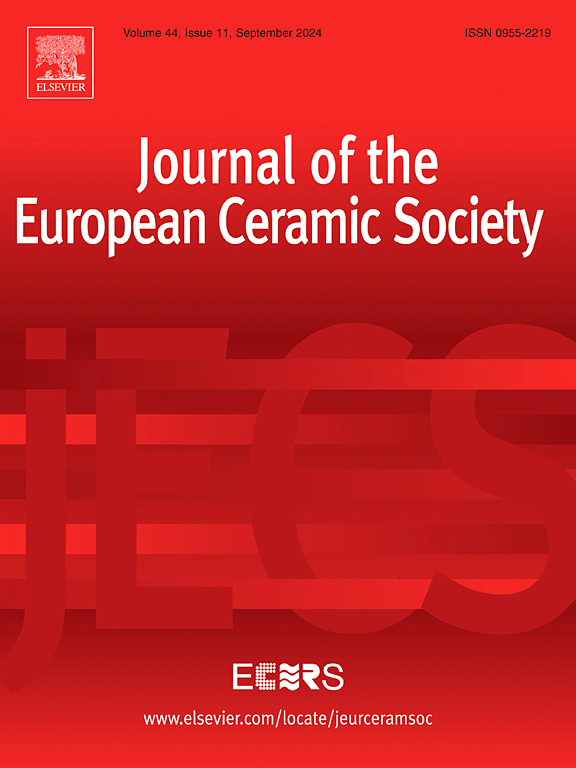Preparation of magnetothermal Fe3O4/MgO/HA composite scaffolds for cancer hyperthermia by Vat Photopolymerization
IF 5.8
2区 材料科学
Q1 MATERIALS SCIENCE, CERAMICS
Journal of The European Ceramic Society
Pub Date : 2024-10-11
DOI:10.1016/j.jeurceramsoc.2024.116983
引用次数: 0
Abstract
Bone defects resulting from bone tumor resections are often complicated with residual cancer cells. To address the challenge, the magnetothermal porous structured bone scaffolds of hydroxyapatite-Fe3O4-MgO (HA-FM) were fabricated by Vat Photopolymerization (VPP). This study improved curing behavior by doping Mg(OH)2 into Fe3O4 powder via the chemical deposition method. Mg(OH)2 functioned as a pore-forming agent during the sintering process, decomposing into MgO to enhance biocompatibility. A two-step debinding method combined with a carbon powder embedding sintering process was used employed to resolve the conflict between the removal of photosensitive resin and the oxidation of Fe3O4. After sintering at 1200°C, the porosity of the composite ceramics reached 69 % and a compressive strength of 2.28 MPa. In vitro mineralization tests showed that doping with Fe3O4 and Mg(OH)2 could promote the scaffolds’ degradation in simulated body fluid (SBF), beneficial to mineralization process. In vitro cell proliferation and adhesion experiments showed that ceramic samples were not cytotoxic and could promote osteogenic differentiation. The composite scaffolds exhibited magnetothermal properties, achieving a temperature increase of 8.2°C in the alternating magnetic field of 92 G and 100 kHz, indicating potential for cancer treatment.
通过槽式光聚合法制备用于癌症热疗的磁热 Fe3O4/MgO/HA 复合支架
骨肿瘤切除术造成的骨缺损往往与残留的癌细胞有关。为了应对这一挑战,研究人员采用蒸气光聚合(Vat Photopolymerization,VPP)技术制造了羟基磷灰石-Fe3O4-氧化镁(HA-FM)磁热多孔结构骨支架。本研究通过化学沉积法在 Fe3O4 粉末中掺入 Mg(OH)2 改善了固化行为。在烧结过程中,Mg(OH)2 可作为孔隙形成剂,分解成氧化镁,从而提高生物相容性。采用两步脱胶法结合碳粉包埋烧结工艺,解决了光敏树脂的去除与 Fe3O4 氧化之间的矛盾。在 1200°C 下烧结后,复合陶瓷的孔隙率达到 69%,抗压强度为 2.28 兆帕。体外矿化试验表明,掺入Fe3O4和Mg(OH)2可促进支架在模拟体液(SBF)中的降解,有利于矿化过程。体外细胞增殖和粘附实验表明,陶瓷样品没有细胞毒性,并能促进成骨分化。复合支架具有磁热特性,在 92 G 和 100 kHz 的交变磁场中温度可升高 8.2°C,这表明它具有治疗癌症的潜力。
本文章由计算机程序翻译,如有差异,请以英文原文为准。
求助全文
约1分钟内获得全文
求助全文
来源期刊

Journal of The European Ceramic Society
工程技术-材料科学:硅酸盐
CiteScore
10.70
自引率
12.30%
发文量
863
审稿时长
35 days
期刊介绍:
The Journal of the European Ceramic Society publishes the results of original research and reviews relating to ceramic materials. Papers of either an experimental or theoretical character will be welcomed on a fully international basis. The emphasis is on novel generic science concerning the relationships between processing, microstructure and properties of polycrystalline ceramics consolidated at high temperature. Papers may relate to any of the conventional categories of ceramic: structural, functional, traditional or composite. The central objective is to sustain a high standard of research quality by means of appropriate reviewing procedures.
 求助内容:
求助内容: 应助结果提醒方式:
应助结果提醒方式:


